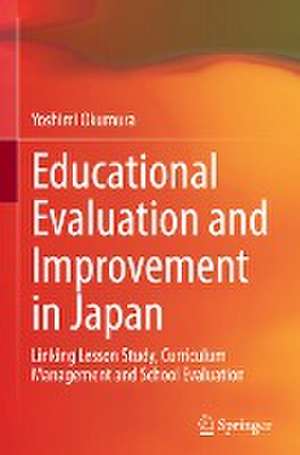Educational Evaluation and Improvement in Japan: Linking Lesson Study, Curriculum Management and School Evaluation
Autor Yoshimi Okumuraen Limba Engleză Hardback – 22 iun 2023
Through in-depth case studies of two primary schools, readers gain a comprehensive understanding of educational evaluation and improvement. The book proposes a new theoretical framework for a comprehensive quality care process that links lesson study, curriculum management, and school evaluation.
Based on authentic assessment, the strategies and examples presented can be applied to any quality system. The conclusion offers core ideas for successful implementation of educational evaluation and improvement.
This book is essential reading for teachers and school leaders seeking tobuild their schools’ quality systems, and for researchers and graduate students interested in improving educational evaluation.
Preț: 889.29 lei
Preț vechi: 1084.49 lei
-18% Nou
Puncte Express: 1334
Preț estimativ în valută:
170.17€ • 181.97$ • 141.88£
170.17€ • 181.97$ • 141.88£
Carte tipărită la comandă
Livrare economică 17 aprilie-01 mai
Preluare comenzi: 021 569.72.76
Specificații
ISBN-13: 9783031330902
ISBN-10: 3031330900
Pagini: 134
Ilustrații: XI, 134 p. 1 illus.
Dimensiuni: 155 x 235 mm
Greutate: 0.4 kg
Ediția:2023
Editura: Springer International Publishing
Colecția Springer
Locul publicării:Cham, Switzerland
ISBN-10: 3031330900
Pagini: 134
Ilustrații: XI, 134 p. 1 illus.
Dimensiuni: 155 x 235 mm
Greutate: 0.4 kg
Ediția:2023
Editura: Springer International Publishing
Colecția Springer
Locul publicării:Cham, Switzerland
Cuprins
Chapter 1. Educational Evaluation and Improvement in Japan: Introduction and Research Question.- Chapter 2. Research Backgrounds and Theoretical Framework.- Chapter 3. Method.- Chapter 4. The Case of the Honden Primary School.- Chapter 5. The Case of the Takakura Primary School.- Chapter 6. Conclusion.
Notă biografică
Yoshimi Okumura is an associate professor at Kyoto University, Japan. She earned her doctorate in education from Kyoto University. She implements joint lesson studies with Japanese schools and analyzes Dutch education to introduce it to Japan. She is author of Kyoiku no jiyuu to gakkou hyoka: Gendai oranda no mosaku (Freedom of Education and School Evaluation: Inquiry in the Netherlands) (in Japanese) (Kyoto University Press, 2016) and coeditor of “Gyakumuki sekkei” jissen gaidobukku [Practical guidebook for “Understanding by design”] (in Japanese) (Nippon-hyojyun, 2020).
Textul de pe ultima copertă
This book delves into how Japanese schools evaluate and enhance education quality through lesson study, curriculum management, and school self-evaluation. It explores the concept of “understanding by design” in the context of the historical background and the challenges of the present, providing practical methods of educational evaluation for the future.
Through in-depth case studies of two primary schools, readers gain a comprehensive understanding of educational evaluation and improvement. The book proposes a new theoretical framework for a comprehensive quality care process that links lesson study, curriculum management, and school evaluation.
Based on authentic assessment, the strategies and examples presented can be applied to any quality system. The conclusion offers core ideas for successful implementation of educational evaluation and improvement.
This book is essential reading for teachers and school leaders seeking tobuild their schools’ quality systems, and for researchers and graduate students interested in improving educational evaluation.
Through in-depth case studies of two primary schools, readers gain a comprehensive understanding of educational evaluation and improvement. The book proposes a new theoretical framework for a comprehensive quality care process that links lesson study, curriculum management, and school evaluation.
Based on authentic assessment, the strategies and examples presented can be applied to any quality system. The conclusion offers core ideas for successful implementation of educational evaluation and improvement.
This book is essential reading for teachers and school leaders seeking tobuild their schools’ quality systems, and for researchers and graduate students interested in improving educational evaluation.
Caracteristici
Examines Japanese education quality methods Provides practical evaluation techniques Demonstrates effective quality care process
